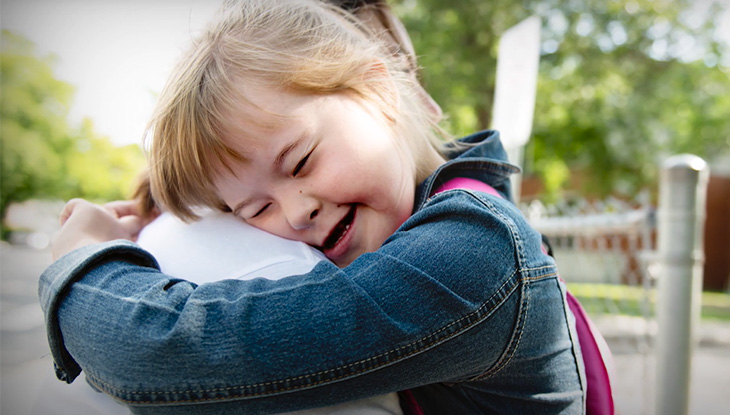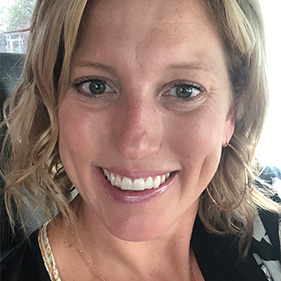Mindfulness group now enrolling parents of children with autism, ADHD and more
Virtual support and self-care group at UC Davis MIND Institute helps build resilience and connections
Mindfulness, the art of being fully present in the moment in a non-judgmental way, can improve mental health and relieve stress. This is especially true for parents with children who are autistic or who have attention-deficit/hyperactivity disorder (ADHD), Down syndrome or another neurodevelopmental condition. Research shows they may face additional stress.
That’s why in 2020 the UC Davis MIND Institute created Get Mindful, a virtual support and self-care group for these parents. Each session is focused on building a mindfulness practice that can have a powerful impact on well-being and parenting. An eight-week, online group session will be held from 2-3 p.m. on Tuesdays, Feb. 13-April 2. Registration is open now. The cost is $250, and scholarships are available.
Katharine Harlan Owens, a patient navigator and program manager at the MIND Institute has an autistic son and has taken part in a previous Get Mindful. In this Q&A, she shares her experience as a parent participating in the group.
Why is it beneficial for parents of neurodiverse children to practice mindfulness?
I think it’s beneficial for all parents to practice mindfulness in their daily lives. It is transformative. Get Mindful works with parents of neurodiverse children specifically because these parents face some unique challenges that parents of neurotypical children may not. This is due to differences that some of our children have with social communication and cognitive functioning. So, this group helps build a sense of community and place for parents to talk about those unique topics with people who really understand neurodiversity.
How can a regular mindful awareness practice help improve parenting?
If we’re less stressed, we feel better, have more energy and can give more as parents. We don’t need to guess on this topic — we know it to be true thanks to decades of research! We say this a lot in Get Mindful: You cannot drink from an empty cup. So, you must find the things in life that fill up your cup, or you’ll be running on empty all the time. And who wants that? This is where practicing mindfulness helps so much. It will fill your cup.
If we’re less stressed, we feel better, have more energy and can give more as parents. We don’t need to guess on this topic — we know it to be true thanks to decades of research!—Katharine Harlan Owens, patient navigator, mom to an autistic child
How can parents build mindfulness into their everyday routine?
I often find that people think mindfulness must tie to one specific practice, like meditation. It doesn’t. Meditation is a great example of a mindful act, but anything that makes you reflect on your thoughts and feelings, non-judgmentally, in the moment, is mindfulness. Taking a hot bath at the end of the day, going on a walk, cooking, reading through a cherished cookbook — all of these things are a practice of mindfulness. It’s what works for your day, your time and your life.
What mindfulness tools do you recommend practicing regularly?
I love body scans. I have a few on YouTube that I use all the time and I do them with my kids, too. I also love an app that features calming sleep stories. And I do simple things like walk my dog, get a hot tea, walk to the American River Parkway and sit in a quiet moment for 5-10 minutes. Mindfulness is not one size fits all. You do you!


Why does the MIND Institute have a support group dedicated to helping parents learn how to be more mindful?
At the MIND Institute, we work directly with parents of neurodiverse kids. So, we have the unique ability and access to reach out and help these parents following clinical visits or diagnosis if they need it. We want them to know they’re not in this alone. We can help. And we do.
What did you learn by taking part in Get Mindful that has changed your life?
I learned that I was not alone. I believe wholeheartedly that finding shared community and shared humanity is what makes parenting possible. Feeling alone and isolated contributes to feelings of depression and anxiety. I think the most powerful thing you can say to someone is, “You’re not alone.” And this group did that for me.
To learn more or register for the Get Mindful group, email hs-mindfnp@ucdavis.edu or call 916-734-4152.
Related stories and resources
The UC Davis MIND Institute in Sacramento, Calif. is a unique, interdisciplinary research, clinical, and education center committed to deepening scientific understanding of autism and other neurodevelopmental conditions. It is a highly collaborative center, bringing together families, researchers, clinicians, community leaders and volunteers with the common goal of developing more personalized, equitable, and scientifically proven systems of support and intervention. The institute has major research efforts in autism, fragile X syndrome, chromosome 22q11.2 deletion syndrome, attention-deficit/hyperactivity disorder (ADHD) and Down syndrome. More information about the institute and its Distinguished Lecturer Series, including previous presentations in this series, is available on the Web at mindinstitute.ucdavis.edu.






